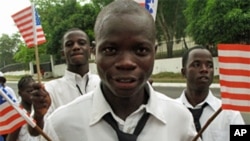U.S. scholars and polling experts say improving America's image in the world is crucial for its security, enabling more effective foreign policy, and attracting major investment and influential students. Even though, the American image abroad has gone up since U.S. Senator Barack Obama became president, they say major challenges remain, especially in Muslim countries.
Polls released last year, by the U.S. Pew Research Center, showed favorable perceptions of the United States and its government went up substantially around the world with exceptions in Muslim countries, such as in Turkey and Palestinian territories.
Pew president Andrew Kohut told a Congressional hearing (International Organizations, Human Rights and Oversight Sub-Committee) Thursday his research indicates this is tied to problems with the historical U.S. ally Israel.
"Years of polling that we have done suggests there will be really little progress until most Muslims come to see the United States as being fair minded in its handling of the Israeli-Palestinian situation," said Andrew Kohut. "And, even though, [Mr.] Obama was seen in a much more positive light, few Muslims that we polled last year believe that [Mr.] Obama would be fair-minded with regard to this relationship."
Kohut says having American forces remain on the ground in Iraq and Afghanistan, two Muslim countries, does not help either. He said one area research shows many Muslims are favorable to the United States is in the way it conducts business and commerce.
"To my mind that is a nerve and I am hopeful the State Department public diplomacy program is operating in a strategic way, looking for the right buttons to push," he said.
Harvard University professor Joseph Nye said even with a better image outside of mostly Muslim areas, such as in Europe, it remains difficult for the U.S administration to convince European leaders to help with more troops in Afghanistan or accept the resettlement of terrorism-related detainees from the U.S. Guantanamo Bay military prison.
"You could say that yes you can find some positive effects from this increase in reputation described by the Pew polls but one should not overstate it," said Joseph Nye. "It is a modest effect, not a huge effect."
Nye said the United States should promote its world leadership in a category he calls public goods, such as promoting green energy, international development and dealing with climate change, rather than being viewed as a military hyper-power acting unilaterally.
"There had been a problem of the past few years, in which we were exporting fear, rather than hope," he said.
Nye also said media which is becoming more and more diverse and accessible is very important. He says when there are reports of civilian casualties during U.S. bombings or evidence of U.S. prisoner abuse, this can create more terrorism, rather than reduce it.
"The extent to which the United States violates human rights or develops a reputation which is symbolized with photos like Abu Ghraib, we essentially help our enemies to recruit," said Nye. "Somebody said in today's world, it is not just whose army wins, it is whose story wins. And if we are not able to get our story across and we give them fuel for their story, it enhances their recruiting."
A third expert, Michael Waller, from the U.S. Center for Security Policy, said the United States should be more aggressive in pushing negative stories about terrorist enemies and those it is trying to contain. He gave the example of Iran's controversial nuclear program, and perceptions of its Supreme Leader, Ali Khamenei.
"He has created himself to be such a super moral figure, a humble man of humble means, but it was in the paper the other day that he is estimated to be worth $30 billion," said Michael Waller.
Waller said discrediting Iran's Supreme Leader, as well as terrorist leaders, when information is found to counter the images of purity they disseminate, would further isolate and marginalize them. He said victories in information battles would make U.S policy goals, such as stopping terrorism and keeping Iran from developing nuclear weapons much more attainable, as well as continuing to improve its image around the world, after years of steady decline.
US Faces Challenges and Weaknesses in Foreign Perceptions




